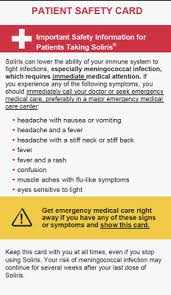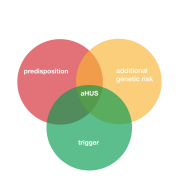It is important that those using complement inhibitors remain alert to meningococcal infection a life threatening side effect of their use. In the USA around 5 users of complement inhibitors will onset with a meningococcal each year. Maybe 10 times that number in the rest of the world.
The infection leads to two significant killer diseases – meningitis and sepsis.
Today 5 October is World Meningitis Day. ( World Sepsis Day was on 13 September)
Although aHUS patients identify mostly with aHUS, the possibility of having meningitis means it is with them too.
The Centre for Disease Control has designated complement inhibitor users as the group most at risk of having a meningococcal infection.
Existing ways of raising alertness of meningococcal infection for aHUS patients centre on two key documents :
– a Package leaflet: information for users of eculizumab or ravulizumab inserted in each vial pack of the drug
– A safety card provided to each patient on induction to using eculizumab/ravulizumab.
Both documents tell the patients about the risk, and list the symptoms, of a possible meningococcal infections like meningitis and sepsis.
Both should be read at the beginning of treatment and at intervals from time to time as a reminder.
The safety card provides a continuous message to users primarily about the recognisable symptoms of a potential infection and a direction to act immediately on them. A safety card is provided to each user at the beginning of a course of treatment and is intended to be kept by the user for duration of treatment and for a short period after discontinuing. It is up to patients to comply.
Historically the part played by aHUS patient advocacy in alerting patient users of complement inhibitors to meningococcal infection is low key. It is a complex topic for advocates who are always mindful that clinical advice should only be provided by those qualified to give it. There are examples of alert message efforts.
Notable among them are unstructured patient discussions in closed social media platforms, the direct messaging to aHUS Foundation contacts at the request of the CDC and articles on the aHUS alliance Global Action website about this side effect and the need for vigilance.
For this World Meningitis Day Paige, an aHUS patient, recalled her encounter with meningitis when treated with a complement inhibitor.
“ Paige became ill with Neisseria Meningiditis infection six months after starting treatment with Ravulizumab for aHUS. She recalled being very tired and sleepy at first and had put it down to a new diet she had started and her power lifting training. Then she had a massive “migraine like” headache and found that she was struggling to lift herself up from sitting or lying down and was very sensitive to daylight. Her family took her to the ER.
Although she did not think she had meningitis she took her patient safety card for those on complement inhibitor treatment. She explained about her aHUS condition which the doctors did not seem to understand. It was May 2020 so their first thoughts were COVID but after several days of multiple tests they suspected meningitis and began intravenous antibiotic treatment. To lessen Paige’s exposure to COVID during a hospital stay she agreed to being an outpatient , going daily to receive her infusion.

As an outpatient and beginning to feel a bit better Paige returned to her training although not performing as well as she was pre infection. She was motivated by a National Competition she had entered. So a week after finishing her outpatient treatment, remarkably, she competed and won.
Paige had received vaccinations for all the meningococcal infection strains , ACWY and B but not prophylactic antibiotics which some doctors prescribe. After her infection she took antibiotics for a year.
Looking back now at what happened to her , Paige’s advice to others is “ I had no idea how serious it can be . Don’t put off symptoms like I did. You cannot be too careful and educate your self. Always carry your patient safety card”
So whilst ways of alerting patients to the risks and symptoms of meningococcal infection already exist, more can always be done to sustain and help patients play their part in taking notice of existing warnings and advice.
Today is World Meningitis Day and patients and advocates could acknowledge that and spread the messages appearing in the social media about this serious and life threatening disease. And listen to what those who have been affected have to say.
On aHUS alliance Global Action’s website we have added a “warning banner” to our home page about the risk of meningococcal infection.
WARNING: Serious meningococcal infection can happen in patients treated with complement inhibitors.Keep up to date with vaccines and boosters. Be vigilant and act quickly on possible symptoms.
Article No. 606


